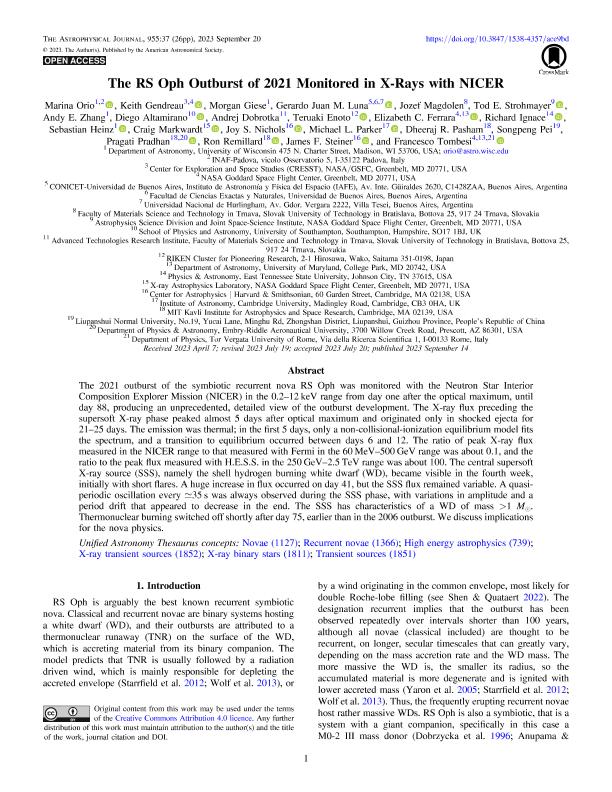Mostrar el registro sencillo del ítem
dc.contributor.author
Orio, Marina
dc.contributor.author
Gendreau, Keith
dc.contributor.author
Giese, Morgan
dc.contributor.author
Luna, Gerardo Juan Manuel

dc.contributor.author
Magdolen, Jozef
dc.contributor.author
Strohmayer, Tod E.
dc.contributor.author
Zhang, Andy E.
dc.contributor.author
Altamirano, Diego

dc.contributor.author
Dobrotka, Andrej
dc.contributor.author
Enoto, Teruaki
dc.contributor.author
Ferrara, Elizabeth C.
dc.contributor.author
Ignace, Richard
dc.contributor.author
Heinz, Sebastian
dc.contributor.author
Markwardt, Craig
dc.contributor.author
Nichols, Joy S.
dc.contributor.author
Parker, Michael L.
dc.contributor.author
Pasham, Dheeraj R.
dc.contributor.author
Pei, Songpeng
dc.contributor.author
Pradhan, Pragati
dc.contributor.author
Remillard, Ron
dc.contributor.author
Steiner, James F.
dc.contributor.author
Tombesi, Francesco
dc.date.available
2023-12-13T14:04:08Z
dc.date.issued
2023-09
dc.identifier.citation
Orio, Marina; Gendreau, Keith; Giese, Morgan; Luna, Gerardo Juan Manuel; Magdolen, Jozef; et al.; The RS Oph Outburst of 2021 Monitored in X-Rays with NICER; IOP Publishing; Astrophysical Journal; 955; 1; 9-2023; 1-26
dc.identifier.issn
0004-637X
dc.identifier.uri
http://hdl.handle.net/11336/220114
dc.description.abstract
The 2021 outburst of the symbiotic recurrent nova RS Oph was monitored with the Neutron Star Interior Composition Explorer Mission (NICER) in the 0.2-12 keV range from day one after the optical maximum, until day 88, producing an unprecedented, detailed view of the outburst development. The X-ray flux preceding the supersoft X-ray phase peaked almost 5 days after optical maximum and originated only in shocked ejecta for 21-25 days. The emission was thermal; in the first 5 days, only a non-collisional-ionization equilibrium model fits the spectrum, and a transition to equilibrium occurred between days 6 and 12. The ratio of peak X-ray flux measured in the NICER range to that measured with Fermi in the 60 MeV-500 GeV range was about 0.1, and the ratio to the peak flux measured with H.E.S.S. in the 250 GeV-2.5 TeV range was about 100. The central supersoft X-ray source (SSS), namely the shell hydrogen burning white dwarf (WD), became visible in the fourth week, initially with short flares. A huge increase in flux occurred on day 41, but the SSS flux remained variable. A quasi-periodic oscillation every ≃35 s was always observed during the SSS phase, with variations in amplitude and a period drift that appeared to decrease in the end. The SSS has characteristics of a WD of mass >1 M ⊙. Thermonuclear burning switched off shortly after day 75, earlier than in the 2006 outburst. We discuss implications for the nova physics.
dc.format
application/pdf
dc.language.iso
eng
dc.publisher
IOP Publishing

dc.rights
info:eu-repo/semantics/openAccess
dc.rights.uri
https://creativecommons.org/licenses/by-nc-sa/2.5/ar/
dc.subject
novae
dc.subject
recurrent novae
dc.subject
high energy astrophysics
dc.subject
X-ray transient sources
dc.subject.classification
Astronomía

dc.subject.classification
Ciencias Físicas

dc.subject.classification
CIENCIAS NATURALES Y EXACTAS

dc.title
The RS Oph Outburst of 2021 Monitored in X-Rays with NICER
dc.type
info:eu-repo/semantics/article
dc.type
info:ar-repo/semantics/artículo
dc.type
info:eu-repo/semantics/publishedVersion
dc.date.updated
2023-12-11T17:46:43Z
dc.journal.volume
955
dc.journal.number
1
dc.journal.pagination
1-26
dc.journal.pais
Reino Unido

dc.journal.ciudad
Londres
dc.description.fil
Fil: Orio, Marina. Istituto Nazionale di Astrofisica; Italia. University of Wisconsin; Estados Unidos
dc.description.fil
Fil: Gendreau, Keith. Center for Exploration and Space Studies; Estados Unidos. National Aeronautics and Space Administration; Estados Unidos
dc.description.fil
Fil: Giese, Morgan. University of Wisconsin; Estados Unidos
dc.description.fil
Fil: Luna, Gerardo Juan Manuel. Universidad de Buenos Aires; Argentina. Universidad Nacional de Hurlingham; Argentina. Consejo Nacional de Investigaciones Científicas y Técnicas; Argentina
dc.description.fil
Fil: Magdolen, Jozef. Slovak University of Technology in Bratislava; Eslovaquia
dc.description.fil
Fil: Strohmayer, Tod E.. National Aeronautics and Space Administration; Estados Unidos
dc.description.fil
Fil: Zhang, Andy E.. University of Wisconsin; Estados Unidos
dc.description.fil
Fil: Altamirano, Diego. University of Southampton; Reino Unido
dc.description.fil
Fil: Dobrotka, Andrej. Slovak University of Technology in Bratislava; Eslovaquia
dc.description.fil
Fil: Enoto, Teruaki. Riken Cluster For Pioneering Research; Japón
dc.description.fil
Fil: Ferrara, Elizabeth C.. University of Maryland; Estados Unidos. National Aeronautics and Space Administration; Estados Unidos
dc.description.fil
Fil: Ignace, Richard. East Tennessee State University; Estados Unidos
dc.description.fil
Fil: Heinz, Sebastian. University of Wisconsin; Estados Unidos
dc.description.fil
Fil: Markwardt, Craig. National Aeronautics and Space Administration; Estados Unidos
dc.description.fil
Fil: Nichols, Joy S.. Harvard-Smithsonian Center for Astrophysics; Estados Unidos
dc.description.fil
Fil: Parker, Michael L.. University of Cambridge; Estados Unidos
dc.description.fil
Fil: Pasham, Dheeraj R.. Mit Kavli Institute For Astrophysics And Space Research; Estados Unidos
dc.description.fil
Fil: Pei, Songpeng. Liupanshui Normal University; China
dc.description.fil
Fil: Pradhan, Pragati. Embry-riddle Aeronautical University, Prescott; China. Mit Kavli Institute For Astrophysics And Space Research; Estados Unidos
dc.description.fil
Fil: Remillard, Ron. Mit Kavli Institute For Astrophysics And Space Research; Estados Unidos
dc.description.fil
Fil: Steiner, James F.. Harvard-Smithsonian Center for Astrophysics; Estados Unidos
dc.description.fil
Fil: Tombesi, Francesco. University of Maryland; Estados Unidos. Universita Tor Vergata; Italia. National Aeronautics and Space Administration; Estados Unidos
dc.journal.title
Astrophysical Journal

dc.relation.alternativeid
info:eu-repo/semantics/altIdentifier/url/https://iopscience.iop.org/article/10.3847/1538-4357/ace9bd
dc.relation.alternativeid
info:eu-repo/semantics/altIdentifier/doi/http://dx.doi.org/10.3847/1538-4357/ace9bd
Archivos asociados
